
Behaviour
"Don't make the mistake of treating your dogs like humans - or they will treat you like dogs."
Martha Scott
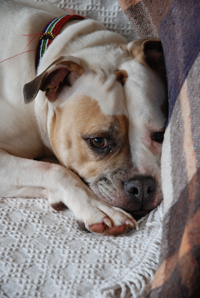
A behaviour consultation will last approximately two hours. The emphasis is on a clear and honest explanation of the problem. Thereafter, I will formulate an effective plan of action to combat the problematic behaviour and thus improve your relationship with your dog. Depending on the issues, you will be given clear guidelines as to whether the behaviour can be eradicated, moderated or controlled. Only practical solutions will be offered.
PLEASE CLICK ON THE LINKS TO THE RIGHT FOR MORE INFO.
Behaviour Consultation
 More
More
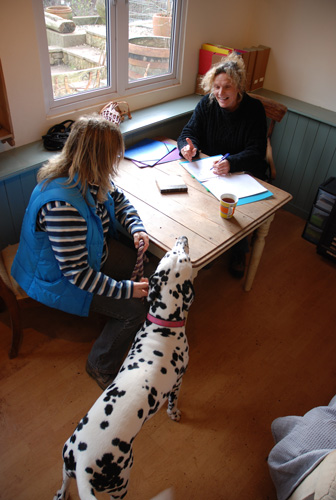
Contact can be made directly, or by referral through your vet. You will be asked for relevant history prior to the appointed date in which you will be requested to outline the problem and provide relevant history, dietary information etc.
The first half of the consultation will largely be spent establishing the nature and cause of the problem through question and answer. You will be given an honest explanation of the problem and a realistic assessment of the possibility of reducing, or eliminating it.
During the second half, work will be done with your dog and yourself on methods and if relevant with equipment to rectify the problem. A follow up report will be promptly issued to remind you of and reiterate all that has been learnt in the consultation.
Although behavioural issues will be dealt with almost always in one session, depending on the problem, it may be suggested that you attend one to one training sessions with Ruth, to improve your handling skills and help you learn how to teach your dog new habits. Attendance or not, will of course be your decision.
Telephone or e mail contact is free, welcomed and ongoing thereafter.
Close
Supervised Walks For Poorly Socialised Dogs
 More
More
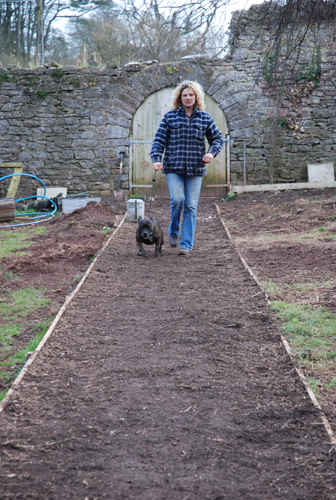
These are aimed at owners who have dogs with poor canine social skills and will provide them with safe, on lead integrated walks, which will help reduce their dog's stress levels around other dogs. There will be no more than five dogs and owners per walk which will take place in public places but each dog and owner will have to undergo an hour long assessment with Ruth prior to attendance. Only one dog per family must attend the walks which will combine a mixture of on lead obedience training and when relevant, meet and greets as a group.
Depending on the severity of the problem it may be necessary to do some one to one work with Ruth and her dogs before attendance can be allowed.This walk must not take the place of usual exercise since the aim is integration and learning social skills so the pace may often be slow. Dogs should be walked before attendance, since a tired dog copes better with stress.
Please be aware that safety will be paramount at all times and supervision stringent, but you will be handling your dog in a public place and responsible for it.
Close
Dog on Human Aggression
 More
More
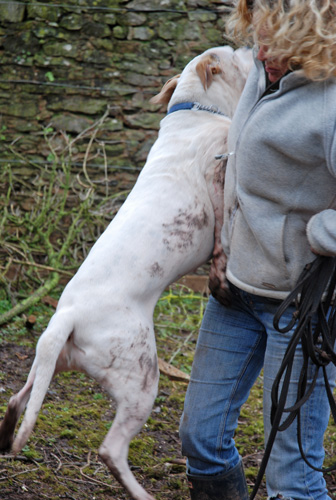
As with dog aggression, this is a complex and varied subject, with no absolutes, each case must be considered individually. It is also the case however, that aggression to humans is either fear or dominance based. Similarly, there can infrequently be a genetic influence where ill considered breeding has taken place.
Fear based aggression may be the result of an early negative experience and depending on the severity of the experience, it's duration, the age and breed of the dog, this problem can be modified or with patience and rehabilitation eradicated.
The balance within the human family also plays a part and modification methods will take this into account.
Close
Dog On Dog Aggression
 More
More
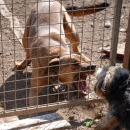
This is a common problem presented throughout the breed spectrum, and in a large majority of cases it is motivated by fear. It occurs mostly due to lack of socialisation in the early stages or, as a result of a traumatic experience with another dog.
Certain breeds such as the shepherding breeds having a more sensitive nature and the bull breeds, inherently less sociable to other dogs require intense socialisation as very young puppies - but any breed can present this problem and controlled, early socialisation is an absolute must for all puppies. A small percentage of cases present with dominance aggression, which tends to be inherent and triggered by a conflict of interest within a group of dogs with more than one clear leader.
To complicate the issue, there are exceptions to all of the above, some dogs are selective, fearful of some dogs not others, fearfully aggressive only in certain places ie the car, on the lead but not off, the list is endless. Largely the extent of the problem depends on the lifestyle of the owner, obviously if other dogs are rarely encountered the problem can be avoided but for owners in densely populated areas, life can become extremely difficult.
Each dog and family circumstance is different, and the causes of the aggression must first be established, before the appropriate plan of action can be implemented. I will assess the level of aggression using my own trained dogs in order to establish a way forward.
Close
Stock Chasing
 More
More
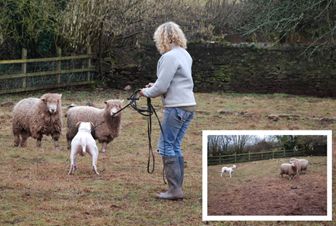
As with shadow, jogger and wheel chasing the instinct to chase stock is entirely natural in a dog. Stock, when chased will almost certainly run, thus intensifying the thrill of the chase.
Some breeds such as the herding guarding breeds are more likely to show interest in stock chasing and some dogs have a naturally high prey drive. These instincts are obviously not too troublesome in the city dwelling dog, not too many sheep in the high street, but country dogs must learn not to chase stock. Stock worrying dogs are an absolute menace in the country and can face dire consequences for their actions. Once the motivation for the behaviour is established it can be eradicated in most cases and I keep my own tame sheep for this purpose.
It is inherent within the DNA of dogs to enjoy the thrill of the chase. Certain breeds such as the border collie, having been bred to herd have a larger propensity for it. However, the inclination is natural to all dogs and also relates to prey drive or hunting for food. Dogs that are perhaps under stimulated through lack of exercise or are left for long periods alone can develop a compulsion to chase moving wheels, joggers or even shadows, and the habit can though not always lead to biting the subject be it human or wheel. The habit can be broken through rehabilitation depending on how entrenched it has become and for how long.
Close
Unruly Behaviour Within the Home
 More
More

Much as it may be tempting to allow your new dog unlimited access to all areas of your home from day one, it can lead to problems later on. Each situation, family and dog are individual. Some dogs can be given unlimited access to the whole house and never step out of line. However, dogs that do become over powering in their behaviour are likely to be dominant by nature and will need to learn new house rules including being denied access to certain rooms in the house,except when invited in. With these dogs it is sometimes advisable to deny access to upstairs and furniture. It is in some cases necessary to rewrite the rule book, using consistent training and reward based rehabilitation of behaviour. These dogs must learn that privilege and reward, including attention, is earned by good behaviour, not demanded by bullying behaviour.
Close
Lack of House Training
 More
More
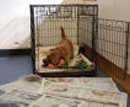
Dogs are not born understanding that newspaper is fine to mess on and carpets are a no no, but they do have an instinct not to mess in the den. A dog that knows your home is it's den is unlikely to want to mess in it. But the pup needs to be taught about the new home which takes time. "Accidents" indoors should be avoided by restricted access initially. Also, we can be very inconsistent in attitudes to toilet training. It is pointless, to smack, shout at, or worse rub a puppy's nose in it since you will only make it fear you, possibly mess more from fear or choose another room to mess in.
As with all interactions with your dog, toilet training must be consistent, clear and ongoing. It is hugely helpful to segregate the puppy in one easy to clean area from the outset, perhaps a kitchen or utility room and cover the floor area with newspaper. The paper can then be reduced as the dog learns to toilet on it until it is no longer necessary. Meanwhile, there are certain times of day that pups are most likely to need to go, for example straight after meals. The pup must be taken out regularly and often to a particular spot in the garden and praised each time it messes outside. Dogs that are inconsistent in toileting are usually the product of inconsistent or unenlightened training.
Close
Constant Barking
 More
More
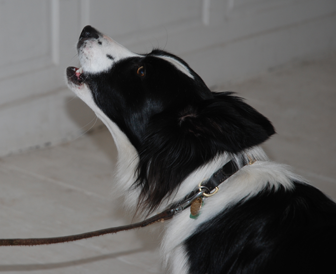
Barking is a natural form of communication for the dog, but quickly becomes the bane of an owner's life when it is excessive. Dogs that bark constantly have often been encouraged to "speak" as puppies by their owners and perhaps praised when they bark at the door bell or postman. These dogs have seldom however been taught to stop barking and can become impossible to live with later. Dogs only continue with a behaviour if there is some reward following it, for example a dog in another room barks and gets let back into the company of it's owner – bingo! Behaviour reinforced by reward.
There can be other causes for barking, such as excitement at travelling in the car, an over bonded dog that cannot be left and so barks, an overly fearful dog that barks at strangers and many more. As with other unwanted behaviours, modification is possible once diagnosis of cause is achieved, but nipping the habit in the bud is preferable to later rehabilitation.
Close
Separation Anxiety
 More
More
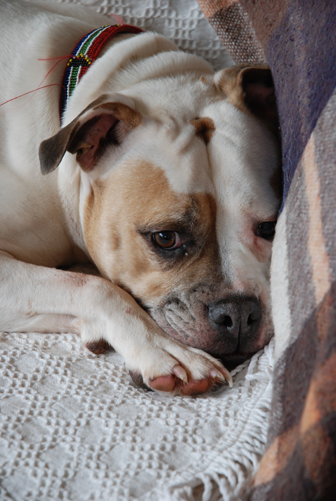
As with most behaviour problems, separation anxiety is, by understanding the needs of your dog, easier to avoid than to correct. The condition commonly occurs when owners have inappropriately showered their new puppy or rescue dog with love and attention, rarely leaving it alone and not providing clear house rules from the outset. It may sound incongruous but it is possible to create a nervous unbalanced dog by trying to provide it with constant love and reassurance. Dogs, as well as needing care and affection, benefit from having their own space, spending reasonable amounts of time alone confident that their owner will return before too long. Dogs are pack animals and we their human family become their pack, so they naturally enjoy being with us. Leaving our dogs alone for long periods is unfair, but likewise it is important that they learn to spend short periods without us from the outset, so that they become confident balanced dogs.
A dog that has no confidence when left alone, is vulnerable to the changing nature of modern life and much more likely to suffer from separation anxiety. Symptoms can include, constant barking, chewing doors, furniture, skirting boards, pacing endlessly, soiling indoors and even in extreme cases self mutilation such as tail chewing. The condition is highly stressful for both dog and owner, is best avoided and often needs patient and ongoing work to modify.
Close
Attention Seeking Behaviour
 More
More
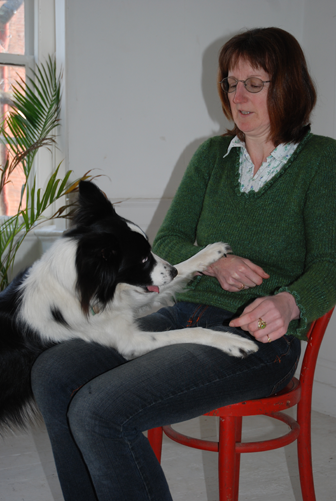
When a new puppy comes home it can seem charming and natural to play with it whenever it asks. It's antics are ceaselessly amusing and whole families often suspend normal living to involve themselves with this charming new addition. However, this seemingly natural reaction can result in problems as the dog becomes adult. A fully grown large, or even annoyingly persistent small dog that jumps up, or barks and paws constantly for attention is usually not considered endearing or charming. It can easily become a danger and a menace to young children and the old and infirm.
Dogs generally only persist in a behaviour if there is something in it for them. Therefore, owners who pay attention to their dogs whenever they demand it are creating a rod for their own backs. Even a negative response such as irritation or frustration, to the dog, is a result. You are suspending what you are doing and paying them attention. A dog that is ignored when it demands attention, but receives it when it is quiet and calm, will not see the value in attention seeking behaviours and stop using them. As ever, with appropriate advice,the problem once established can be eradicated, but it is far easier through correct leadership and appropriate training to avoid in the first place.
Close

